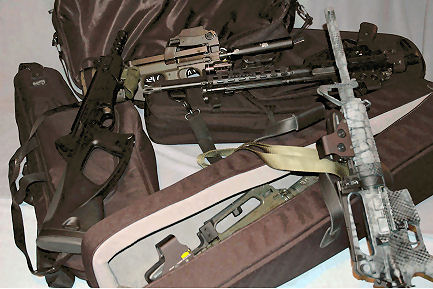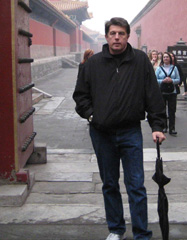Analyze which people are critical to your organization. Have any of these people been subject to threats? In what situations are they most vulnerable? Do they keep a low profile or court media attention? Is it easy for outsiders to gain information about them and their families? Answers to these questions help determine if you need a little caution or a full-time security detail.
Second Aid: Preparing for Medical Emergencies
By R. E. Rick Colliver
As a former Emergency Medical Technician and Rescue Diver, I have seen first aid and trauma kits of varying sizes, shapes and colors that included enough equipment to operate a MASH unit at the site of a catastrophe for a month. On the other hand, the most experienced flight nurse/combat medic I’ve ever known once said that if he had a 2X2 bandage and a pair of rubber gloves, he was “good to go” for almost any occasion. This illustrates that it’s the “carpenter and not the tools” that usually gets the job done, and thus competent, recurrent training becomes an essential component in the protection specialist’s toolbox.
[Read more…] about Second Aid: Preparing for Medical Emergencies
No High Paycheck without Homework
I am a fan of Lisa Irby’s blog 2 Create a Website, and frequently check her site to see what she’s got to say.
In her post Lazy People, she shares her thoughts on laziness and it really, really struck a chord for me.
I must tell you, I have a pet peeve; poorly written or form letters. Sending the wrong letter in haste can do more harm than good. Don’t be lazy.
Be sure to check the appropriateness of your letter to its recipient. It appears that many individuals wishing to obtain employment in the executive protection field are failing to conduct due diligence. “Due diligence” means conducting the advance work and investigation required to craft a suitable cover letter to a particular individual or firm. The cover letter is the very first impression that you are making on an individual who is doing the hiring. If you cannot provide an appropriate and suitable cover letter, you have already failed your first detail. You simply will not be contacted for an interview.
INNOVATIVE
By: Sean Spellecy
Smile Bodyguard Smile…
No Neck, No Smile, Intimidating Stare, Mean Looking, No Smile, etc… Sound familiar? It is the way bodyguards have been described for years. It is time we changed the way we look. I own a personal protection agency in Tulsa, Oklahoma and one of the first things I look for in a prospective agent is the ability to smile. Why you ask? Are not bodyguards supposed to scare people off without even so much as a movement? Do we not want people to intimidate just on a glance, a glance that tells any would be threat that coming near our asset would be a mistake? The answer is of course we do!
However, the problem rests in being mindful enough to turn it on and off. The “Bodyguard Industry” needs rejuvenation and reinvention and it starts with a smile. What we have done here in Tulsa, and what will be replicated throughout the country in the next two years is not just learning the importance of smiling. However, it does lend itself to the recipe for our success. “Smiling” lets your client know that you have a personality, that you know how to enjoy life, and most importantly, you are confident in who you are and what you are doing. Does the ability to smile make up for the ability to recognize a dangerous situation beforehand? How about the ability to disarm a threat, or move your asset through a hostile crowd? Absolutely not. Yet, I have had men and women through my door (and then out again) that I am sure could handle themselves quite well.
They just never smiled!
Gear Down!
Gear Down! Staying Below the RADAR in Protective Operations
By: R. E. Rick Colliver
Let’s face it; we all like gear! More importantly, we like the kind of gear that the high-speed operators endorse. Whether we intend to use it every day in a demanding environment, or throw it in the trunk of our car “for that day”, we want to know that we are using what the experts recommend. We are proud of our gear, and we want our peers to know that we wear, carry or shoot, only the finest. Many of us have seen (or owned) the T-shirt that says “If you die first, we’re splitting up…”; enough said.
However, when working in the often-misunderstood field of protective operations, calling attention to our gear is usually a mistake. It lets others know who we are, and it often alienates or worries the very people we are assigned to protect. If we think back to the principal focus of a protective mission, it is not only to prevent the intentional or unintentional injury to the protectee, but also to prevent embarrassment. And, protection can only be successful if the protectee and their organization are cooperative and engaged.
Interview with John Sexton
John Sexton has over 20 years of experience in law enforcement and security, both in the United States and abroad. He’s written numerous articles on security-related topics for international publications, and Sexton Executive Security provides services and training for government agencies and Fortune 500 companies. John recently traveled to China, the Middle East and India and he’s planning executive security training programs in Beijing, Shanghai, Saudi Arabia and the U.A.E.
BGC: How did you get started in the Executive Protection Field?
JS: Actually I can still vividly recall the first E.P. detail I ever worked. It was in the early 80’s in Ireland and I was assigned to protect a judge who was sitting on the bench trying a Terrorist (Offenses Against the State Act) case. At that time our terrorists thought nothing of assassinating a judge in order to have a case halted. It was their way of getting an adjournment.
I was a uniformed Police Officer and the job needed to be done by a plain clothes officer. That morning when I reported for duty, the Station House Sergeant told me to go home and change into “civvies” as I would be protecting the judge. I went down to the Judge’s home where we had a temporary trailer parked for the duration of the trial. The officer I was relieving handed me an old Webley revolver and a lozenge can which contained a handful of bullets. Thankfully the terrorists didn’t show up during my shift as I am quite sure that my weapons (probably dating back 60 years to our civil war) wouldn’t have even slowed them down as they were typically equipped with Armalite Rifles and Semtex when they were activated for a mission.
BGC: Who are your typical clients? Celebrities, executives, political figures?
JS: We have celebrity, executive and political clients at times. The majority of the time though, our clients are executives.
BGC: What factors should new people who are interested in getting into this field consider? [Read more…] about Interview with John Sexton




